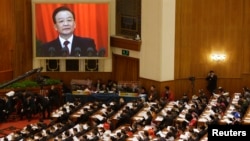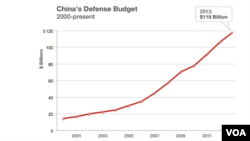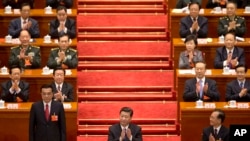BEIJING —
China’s Communist Party leaders said they will give quality-of-life issues and the environment a higher priority in the coming years, even as the country seeks to deepen its economic development and raise the competitiveness of the world’s second-largest economy.
Much of Premier Wen Jiabao’s final address to China’s parliament on Tuesday - a 100-minute end piece called the Government Work Report - was what one would expect.
Long lengthy lists of what he said China has accomplished in the past five years: the country’s successful response to the global financial crisis, the creation of more than 58 million urban jobs, as well as its hosting of the Olympics in Beijing and World Expo in Shanghai.
Among other things, Wen ticked off construction statistics about how nearly 20,000 kilometers of new railway and more than 600,000 kilometers of new roads were built during that period.
Wen said China’s economy will continue to grow at a steady pace this year of around 7.5 percent.
He also announced that defense spending will once again see double-digit growth of around $119 billion for 2013, and that domestic security spending will again exceed what China spends on its military.
Improving lives
However, Wen said China also faces many problems and that some people “still lead hard lives.” He says that unbalanced, uncoordinated and unsustainable development remains a prominent problem
Wen said Chinese society has undergone profound changes and that social problems have increased. He says that the government must make the people’s well-being the starting point and goal of all government work and give it higher priority.
Premier Wen also said that the government should do more to strengthen environmental protection and safeguard the public’s health. He says authorities should give the people hope by taking concrete actions.
In recent years, the public has become more vocal in its calls for cleaner air and water, better food and drug safety, and better medical and health care services. Many have begun to question whether China’s fast-paced economic development is worth the social costs the public and the environment has had to pay in the process.
The corruption issue
Wen’s speech was light, however, on a topic that the government itself has recently given renewed attention to: the problem of official corruption.
Hu Xingdou, a professor at the Beijing Institute for Technology, said it is not that the government has not done anything to address the problem, but rather that the government is facing a dilemma.
Hu said the reason the government is not mentioning the topic or saying very much about it now is because they know that, if they do, they will need to take a modern systematic approach to the problem, such as requiring officials to disclose their assets. But, he said, they would not dare to do that. If they did, people would be demanding that public officials disclose their assets.
According to official corruption statistics, more than 740 provincial-level officials were removed from their posts in the past five years because of corruption. More than 9,000 were dismissed at the county level.
Last year, authorities took more than 33,000 corruption cases between January and November. The cases involved more than 46,000 individuals. Of that total, nearly 2,500 were government employees.
Much of Premier Wen Jiabao’s final address to China’s parliament on Tuesday - a 100-minute end piece called the Government Work Report - was what one would expect.
Long lengthy lists of what he said China has accomplished in the past five years: the country’s successful response to the global financial crisis, the creation of more than 58 million urban jobs, as well as its hosting of the Olympics in Beijing and World Expo in Shanghai.
Among other things, Wen ticked off construction statistics about how nearly 20,000 kilometers of new railway and more than 600,000 kilometers of new roads were built during that period.
Wen said China’s economy will continue to grow at a steady pace this year of around 7.5 percent.
He also announced that defense spending will once again see double-digit growth of around $119 billion for 2013, and that domestic security spending will again exceed what China spends on its military.
Improving lives
However, Wen said China also faces many problems and that some people “still lead hard lives.” He says that unbalanced, uncoordinated and unsustainable development remains a prominent problem
Wen said Chinese society has undergone profound changes and that social problems have increased. He says that the government must make the people’s well-being the starting point and goal of all government work and give it higher priority.
Premier Wen also said that the government should do more to strengthen environmental protection and safeguard the public’s health. He says authorities should give the people hope by taking concrete actions.
In recent years, the public has become more vocal in its calls for cleaner air and water, better food and drug safety, and better medical and health care services. Many have begun to question whether China’s fast-paced economic development is worth the social costs the public and the environment has had to pay in the process.
The corruption issue
Wen’s speech was light, however, on a topic that the government itself has recently given renewed attention to: the problem of official corruption.
Hu Xingdou, a professor at the Beijing Institute for Technology, said it is not that the government has not done anything to address the problem, but rather that the government is facing a dilemma.
Hu said the reason the government is not mentioning the topic or saying very much about it now is because they know that, if they do, they will need to take a modern systematic approach to the problem, such as requiring officials to disclose their assets. But, he said, they would not dare to do that. If they did, people would be demanding that public officials disclose their assets.
According to official corruption statistics, more than 740 provincial-level officials were removed from their posts in the past five years because of corruption. More than 9,000 were dismissed at the county level.
Last year, authorities took more than 33,000 corruption cases between January and November. The cases involved more than 46,000 individuals. Of that total, nearly 2,500 were government employees.






